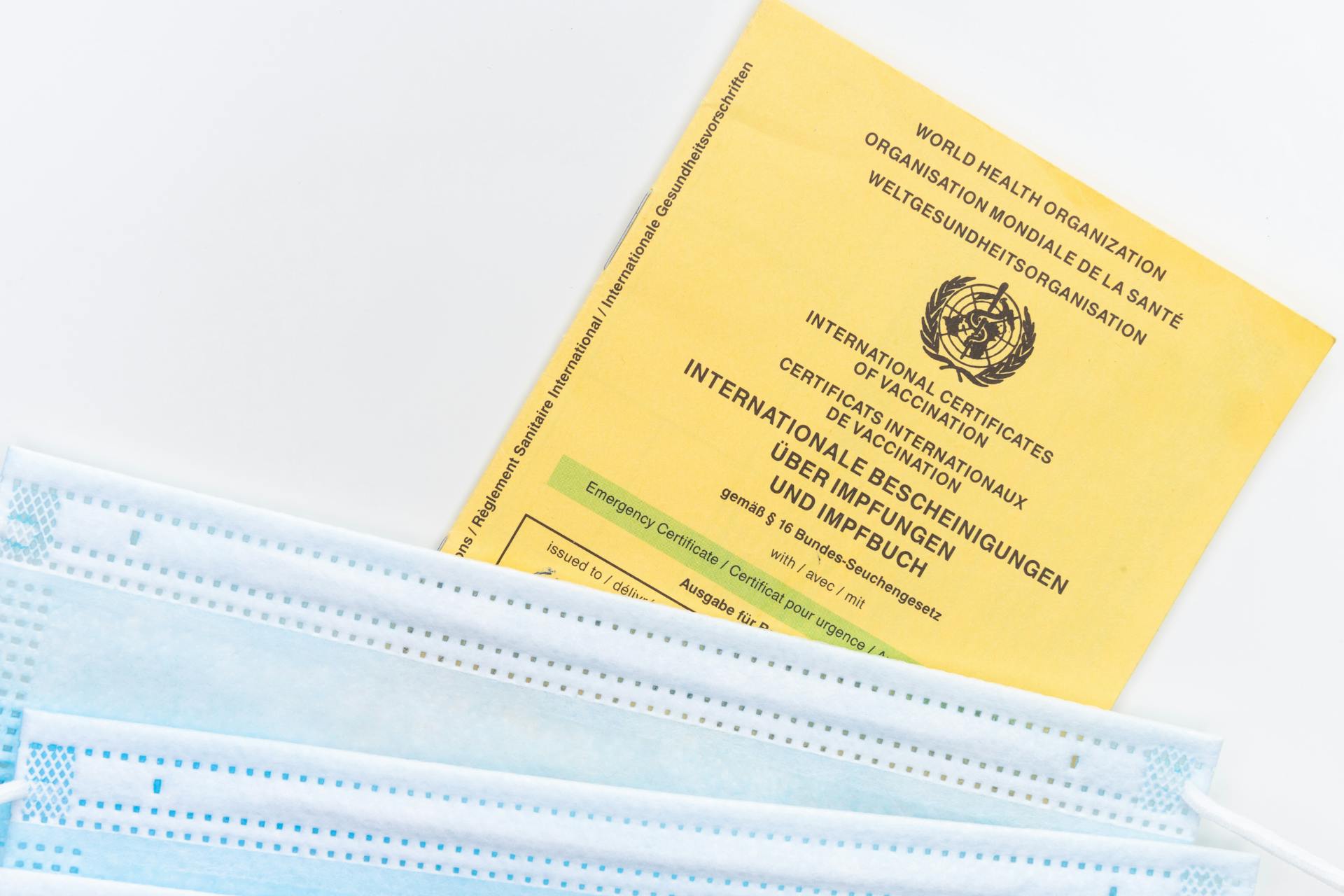
Traveling with your furry friend to the EU can be a bit of a challenge, but don't worry, I've got you covered.
The EU health certificate for dogs is a mandatory document that needs to be obtained before traveling to the EU with your pet. It's essential to get it from a licensed veterinarian within 10 days of travel.
You'll need to provide your dog's vaccination history, and the vet will issue a health certificate that's valid for 10 days. Make sure to check the EU's requirements for your dog's vaccinations before getting the certificate.
The EU health certificate is a crucial document that ensures your dog's health and safety during travel, as well as the health and safety of other animals and humans in the EU.
Travel Requirements
If you're planning to travel with your dog to an EU country, you'll need to get an EU health certificate dog. This document confirms that your dog has been vaccinated against rabies at least 21 days before travel.
To ensure a smooth trip, you'll also need to get an animal health certificate from your vet. This certificate is valid for 10 days for entry into the EU or Northern Ireland.
You can use a valid pet passport if it's accepted in the country you're traveling to. However, if you're traveling from Great Britain to the EU, you can't use a pet passport issued in Great Britain.
Here are some countries where you can use a pet passport:
- Finland
- Ireland
- Malta
- Northern Ireland
- Norway
Remember, all your pets must meet all the other requirements for pet travel to that country.
Compliance and Documents
You'll need an EU health certificate for your dog to travel to the EU or Northern Ireland, which is valid for 10 days after the date of issue. This certificate will also be accepted for onward travel within the EU after you enter the EU.
Your vet must issue the certificate, and it's essential to check the specific requirements for your destination country. For example, if you're traveling to Ireland, your dog must be treated for tapeworm (Echinococcus multilocularis) before each trip.
You can use a valid pet passport if it's accepted in the country you're traveling to, but not a pet passport issued in Great Britain to enter the EU. Some countries, such as Finland, Ireland, Malta, Northern Ireland, and Norway, still accept pet passports.
Here's a quick rundown of the tapeworm treatment requirements:
- Administered by a veterinarian between 24 hours and 120 hours before arrival in Ireland
- Must contain praziquantel
- Recorded in the pet passport or EU health certificate
Compliance checks may be performed at the port or airport of arrival, and there's a fee for these checks, although guide dogs and pets entering from Great Britain are exempt.
Obtain Travel Documents
To obtain travel documents for your pet, you'll need an EU Pet Passport or an EU Animal Health Certificate PDF.
Schedule an appointment with a veterinarian who is authorized to issue EU health certificates, and ensure your pet is up to date on vaccinations, especially rabies. The veterinarian will conduct a thorough examination of your pet and fill out the necessary forms if everything is in order.
Recommended read: Pet Health Dog Tear Stain Remover

The EU Animal Health Certificate PDF will include details such as microchip information, vaccination records, and a declaration of your pet's health status. This document is valid for 10 days for entry into the EU or Northern Ireland, 4 months for onward travel within the EU after you enter the EU, and 4 months for re-entry to Great Britain.
If you're traveling with a dog, you'll need an EU health certificate dog, which confirms that your dog has been vaccinated against rabies at least 21 days before travel and meets all other health requirements.
Tapeworm treatment is required for dogs entering Ireland from certain countries, and the treatment must contain praziquantel and be administered by a veterinarian no less than 24 hours and no more than 120 hours before the scheduled arrival time in Ireland.
Here are the valid pet travel documents for certain countries:
- Finland: valid pet passport
- Ireland: EU animal health certificate or valid pet passport
- Malta: valid pet passport
- Northern Ireland: EU animal health certificate or valid pet passport
- Norway: valid pet passport
Failing Compliance Checks
If your pet fails the compliance checks, it may be refused entry into Ireland.
The consequences of failing compliance checks can be severe, with your pet possibly being placed into quarantine under official control for the necessary tests or vaccinations.
You'll be responsible for covering the costs associated with this process, so it's essential to be aware of the expenses and requirements involved.
In extreme cases, the pet may even be euthanised, which is a heartbreaking outcome for any pet owner.
It's crucial to make contact with the quarantine facility immediately to make arrangements for your pet and to understand the costs and requirements associated with this process.
Travel Process
The travel process for your furry friend can be complex, but don't worry, I've got you covered. You'll need to get an animal health certificate from your vet if you're traveling to an EU country or Northern Ireland.
The certificate will be valid for 10 days for entry into the EU or Northern Ireland, and 4 months for onward travel within the EU after you enter the EU, as well as 4 months for re-entry to Great Britain. That's a lot of traveling, but with the right documents, you're good to go.
Broaden your view: Who Makes 4 Health Dog Food
To ensure your pet's health certificate is valid, make sure to check the list of countries that accept pet passports, including Finland, Ireland, Malta, Northern Ireland, and Norway. However, if you're traveling to the EU from Great Britain, you'll need to use an animal health certificate instead of a pet passport.
The entire process of immigrating with pets can take around 3-6 months, depending on the destination country and your pet's health condition. To give you a better idea, here's a list of the steps involved in pet immigration:
- Microchip
- Vaccinations and vaccination records
- Other treatments
- Providing pet shot records
- Providing pet health certificates/animal health certificates
- Animal import permit (applicable to certain countries/regions)
- Blood tests
- Booking for quarantine upon arrival (applicable to certain countries/regions)
- Dog license (required in certain countries/regions)
- Captain's declaration form (required by some countries)
- Airway bill (required for air transport)
Remember, it's essential to understand the entry and exit policies of the specific regions and countries you're traveling to, as well as the latest pet immigration regulations and requirements of airlines and customs.
General Information
If you're planning to travel to Europe with your dog, you'll need to obtain an EU health certificate. This document is mandatory and must be issued by a licensed veterinarian within 5 days prior to arrival.
The requirements for the EU health certificate include a health certificate, microchip, pet information, vaccination, and other treatment. Your veterinarian will need to examine your dog before issuing the certificate.
You have two options for obtaining an EU health certificate: obtaining an EU Animal Health Certificate or having the government veterinarian endorse the EU Pet Health Certificate issued by a registered veterinarian.
To apply for an EU health certificate, you'll need to complete the prescribed EU pet health certificate PDF and submit it to the relevant authority. You can download Adobe Acrobat Reader from http://www.adobe.com to view the PDF file.
Here are the requirements for non-commercial movement of pets to Europe:
- The pet and owner's entry must not exceed 120 hours.
- No tax payment is required.
If your transportation exceeds 120 hours, it will be considered commercial movement and you'll need to pay approximately 20% tax.
To ensure a smooth application process, make sure to make an appointment with the authority at least ten working days before the intended examination of your dog.
Important Considerations
If you're planning to transport your furry friend to Europe, there are some important considerations to keep in mind. The non-commercial movement method is generally recommended for pet travel to Europe.
To qualify for non-commercial movement, your pet's entry must not exceed 120 hours. This means you'll need to plan your trip accordingly to avoid commercial movement requirements.
No tax payment is required for non-commercial movement, which is a bonus for pet owners. However, if your transportation exceeds 120 hours, it will be considered commercial movement and you'll need to pay approximately 20% tax.
A health certificate is mandatory for pet travel, and it must be issued by a licensed veterinarian. The requirements for the health certificate include:
- EU Health Certificate dog within 5 days prior to arrival
- EU Health Certificate cat within 10 days prior to arrival
- Microchip
- Pet information (Breed, color, date of birth, etc.)
- Vaccination
- Other Treatment
To export your pet from Hong Kong, you can obtain an EU Animal Health Certificate or have the government veterinarian endorse the EU Pet Health Certificate issued by a registered veterinarian.
Sources
- https://longhaultrekkers.com/how-to-get-an-eu-pet-passport/
- http://www.pettravel.gov.ie/pets/dogscatsferrets/other/
- https://www.gov.uk/taking-your-pet-abroad/travelling-to-an-eu-country-or-northern-ireland
- https://djangobrand.com/blogs/news/how-to-take-your-dog-to-europe
- https://pettravel.com.hk/eu-pet-animal-health-certificate/
Featured Images: pexels.com


